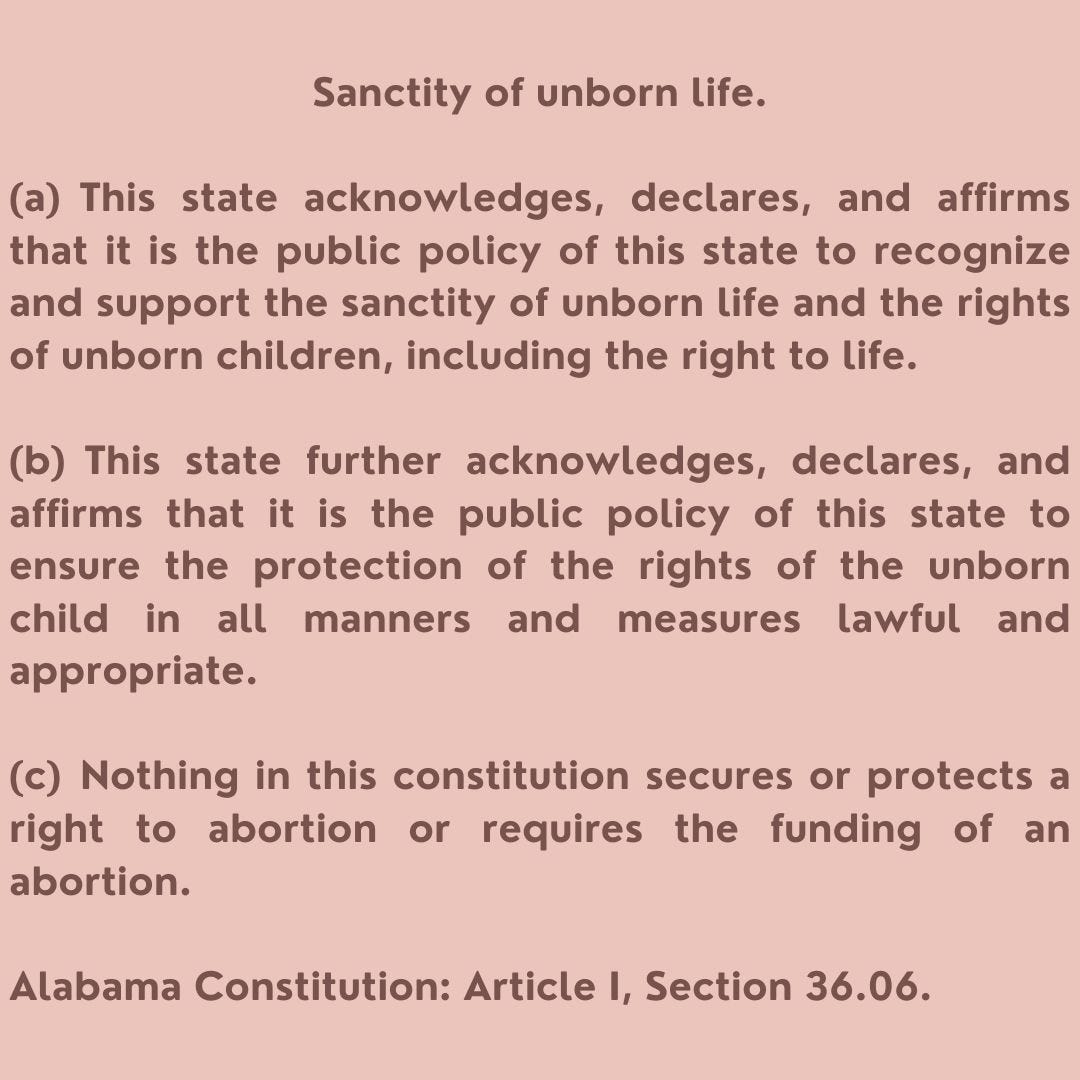This Week in Abortion: IVF, the Forgotten States, and the Rift
A collection of good reads, events from the week, and policy insights.
Welcome back to your weekly roundup of good reads, news updates, and policy insights on abortion.
I was away a bit longer than intended, and we had just a few things happen while I was gone! So, instead of the usual news readout, this edition is one long-form piece centered around the IVF news. I hope it adds some new perspective and thoughts to what you are already reading.
As always, this is meant to be a conversation, not my personal megaphone. So, thank you for coming with an open mind. I encourage you to reply with comments, write to me directly, or send this to your family and friends to consider in private. Just be kind.
IVF, the Forgotten States, and the Rift
In late February, Alabama’s Supreme Court ruled that frozen embryos can be considered children under state law, with their destruction amounting to a wrongful death. Last week, their legislature passed a narrow fix that seems like it will allow IVF treatments to move forward. But, the State’s constitution, critical to the ruling, hasn’t changed. which means there are likely more legal battles ahead.
The Forgotten States
Alabama is one of a few states whose constitutions explicitly remove the right to an abortion.
The others are Tennessee, Arkansas, Louisiana, and West Virginia. I call these the Forgotten States. While everything is bigger in Texas, including media attention, these states are the true home base of the anti-access movement. They are also among the poorest and most religious states in the country, they tend to have lower voter engagement, and they will be the hardest states to move.
It was truly positive, and never a given, that Alabama legislators passed an IVF fix. Legislators in the remaining Forgotten States have so far declined to protect their residents in the event their courts make the same determination that Alabama’s did. In fact, on Tuesday, Tennessee legislators rejected a bill aimed at protecting existing access to contraception and IVF treatments.
In Louisiana, whose legislative session starts tomorrow, destroying embryos has been illegal for 40 years. Yes, you read that correctly. The Washington Post has more on the extreme steps patients have to go through to dispose of extra embryos. As of now, there are bills in the LA state senate and house aiming to protect contraception, but nothing has been introduced related to IVF. In this context, it almost seems big of one West Virginia legislator to include minimal IVF and contraception protections in his personhood bill, which otherwise determines that a human is created at the “moment of fertilization or cloning.”

It’s certainly helpful to protect access to these medical services around the country. But, in the Forgotten States - where legislators have generally voted against any kind of exemptions to abortion bans - these efforts may be the best chance to make positive change.
The Rift
The most powerful forces behind the anti-access movement are also anti-IVF. To them, abortion and IVF are the same thing. This is not hyperbole, this is from their own words.
In a letter to Alabama Governor Kay Ivey, Susan B. Anthony Pro-Life America, Students for Life Action, March for Life Action, the Southern Baptist Convention, the CatholicVote, the Family Research Council and others said, “Embryos must be accorded the same human rights and level of dignity that all other human beings—at every developmental stage of life—are granted.”
On the other hand, half of Republicans support access to contraception and IVF, even if they don’t support abortions. There is a rift here between anti-abortion extremists and the GOP. It’s also, just maybe, a moment for kind education, outreach, and connection.
If we can agree that a frozen embryo is not a person, what is? Does it become a person after implementation, and if that’s the case, put aside abortion as we typically frame it, at what point does a pregnant person become negligent because they aren’t prioritizing the potential needs of the “person” in their uterus over their own?
These are not abstract questions. The criminalization of pregnancy is a very real problem. As such, these are important things to talk about with people in your life or to work through yourself where relevant.
The heart of the anti-access movement is not about families or even about God, it is about a fanatic dedication to a remarkably consistent logic: Fertilization (egg + sperm) is life, that life can’t protect itself and therefore must be protected by the law at all costs. Those costs are real - both to individuals and families - are borne by the poorest among us, and are something that the anti-access movement is perfectly willing to accept. The Alabama case and aftermath will show us how far partners to the movement are willing to go to preserve this ideal.
Thanks for reading This Week in Abortion. Show some love, Click the ❤️ button!






